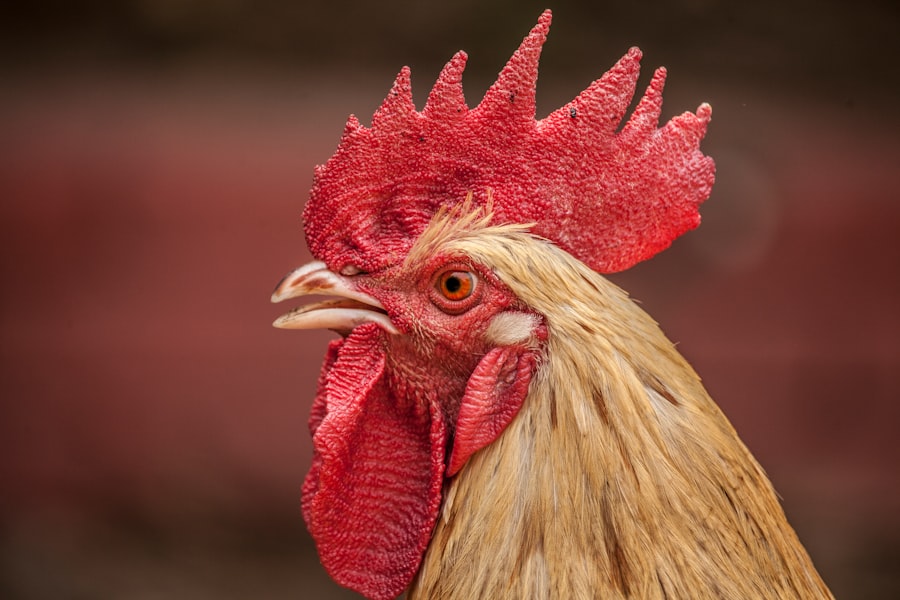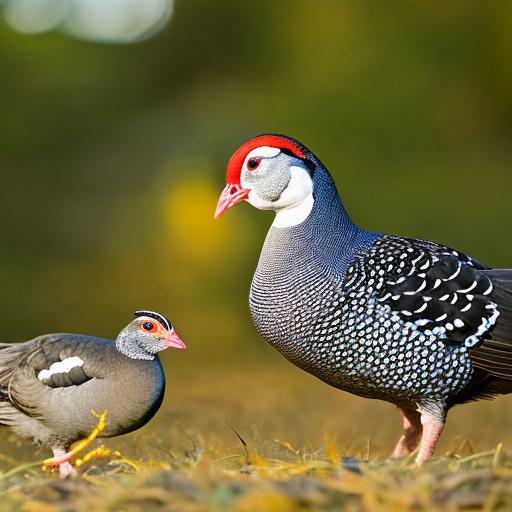Guinea hens and chickens are both popular choices for backyard poultry enthusiasts. They are often kept together due to their compatibility and the benefits they provide to each other. Guinea hens are known for their pest control abilities, while chickens are valued for their egg production. Additionally, both species can provide companionship and entertainment for their owners.
Key Takeaways
- Guinea hens and chickens can be kept together and provide benefits to each other.
- Guinea hens are more independent and better at foraging, while chickens are better at laying eggs.
- Adequate space is important for both guinea hens and chickens to prevent stress and aggression.
- Guinea hens and chickens have different nutritional needs and require different types of feed.
- Proper introduction and monitoring is necessary to ensure compatibility and prevent disease transmission.
The Benefits of Keeping Guinea Hens and Chickens Together
One of the main benefits of keeping guinea hens and chickens together is pest control. Guinea hens are excellent at foraging and hunting insects, making them natural pest control agents. They will eat a wide variety of insects, including ticks, fleas, and even small rodents. By keeping guinea hens and chickens together, you can reduce the number of pests in your yard or garden.
Another benefit of keeping guinea hens and chickens together is increased egg production. Guinea hens are not prolific layers like chickens, but they do lay eggs. By keeping them together with chickens, you can enjoy a variety of eggs from both species. This can be especially beneficial if you sell eggs or want a diverse selection for your own consumption.
Lastly, keeping guinea hens and chickens together can provide companionship. Both species are social animals and enjoy the company of others. They will often interact with each other, providing entertainment for their owners. Watching the guinea hens and chickens interact can be a source of joy and amusement.
The Differences Between Guinea Hens and Chickens
While guinea hens and chickens have some similarities, there are also notable differences between the two species. One obvious difference is their physical appearance. Guinea hens have a unique appearance with their featherless heads and bony casques on top of their skulls. Chickens, on the other hand, have feathered heads and a variety of different breeds with distinct appearances.
Behaviorally, guinea hens and chickens also differ. Guinea hens are known for their alert and vigilant nature. They are excellent at detecting predators and will sound the alarm with their loud calls. Chickens, on the other hand, are generally more docile and less likely to raise an alarm. They tend to rely on guinea hens for protection.
Vocalizations are another area where guinea hens and chickens differ. Guinea hens are known for their loud and distinctive calls, which can be quite noisy. Chickens, on the other hand, have a variety of vocalizations but are generally not as loud as guinea hens. Some people find the guinea hens’ calls charming, while others may find them annoying.
The Importance of Providing Adequate Space for Guinea Hens and Chickens
Both guinea hens and chickens require adequate space to thrive. It is important to provide enough space for them to move around freely and engage in natural behaviors. The minimum space requirements for guinea hens and chickens vary depending on the source, but a general guideline is to provide at least 4 square feet per bird in a coop or enclosed area.
Overcrowding can lead to various problems, including stress, aggression, and increased risk of disease transmission. When birds are overcrowded, they may become more aggressive towards each other, leading to injuries or even death. Additionally, overcrowding can increase the risk of disease transmission as birds are in close proximity to each other.
The Nutritional Needs of Guinea Hens and Chickens
Guinea hens and chickens have different nutritional needs, although there is some overlap in their diets. Guinea hens require a higher protein diet compared to chickens due to their insectivorous nature. They need a diet that includes a good source of animal protein, such as insects or high-quality poultry feed.
Chickens, on the other hand, have a more varied diet and can thrive on a combination of grains, vegetables, and protein sources. They require a balanced diet that includes carbohydrates, protein, fats, vitamins, and minerals. Commercial poultry feed is often formulated to meet the nutritional needs of chickens.
When keeping guinea hens and chickens together, it is important to provide a balanced diet for both species. This can be achieved by offering a combination of poultry feed, grains, vegetables, and insects. It is also important to provide access to fresh water at all times.
The Compatibility of Guinea Hens and Chickens in Terms of Temperament

Guinea hens and chickens can be compatible in terms of temperament, but it is important to introduce them properly. Guinea hens are generally more assertive and dominant compared to chickens. When introducing guinea hens to a flock of chickens, it is best to do so gradually and under supervision.
To introduce guinea hens to a flock of chickens, it is recommended to keep them separate initially. This allows the birds to see each other without direct contact. After a period of time, they can be introduced in a controlled environment where they can interact but still have some separation.
Signs of aggression to watch for include pecking, chasing, or excessive aggression towards one bird. If any signs of aggression are observed, it may be necessary to separate the birds temporarily or permanently. It is important to monitor their interactions closely during the introduction process.
The Importance of Properly Introducing Guinea Hens to a Flock of Chickens
Properly introducing guinea hens to a flock of chickens is important for the well-being of all birds involved. One important step in the introduction process is quarantine. Quarantining new birds before introducing them to an existing flock helps prevent the spread of diseases.
During the quarantine period, new birds should be kept separate from the existing flock. This allows for observation and monitoring for any signs of illness. It is recommended to quarantine new birds for at least 30 days before introducing them to the existing flock.
When introducing guinea hens to a flock of chickens, it is best to do so gradually. Start by allowing the birds to see each other without direct contact. After a period of time, they can be introduced in a controlled environment where they can interact but still have some separation. This gradual introduction helps reduce the risk of aggression and stress.
The Risk of Disease Transmission Between Guinea Hens and Chickens
Both guinea hens and chickens are susceptible to various diseases, some of which can affect both species. Common diseases that can affect both guinea hens and chickens include respiratory infections, parasites, and viral diseases such as avian influenza.
To prevent the spread of disease, it is important to practice good biosecurity measures. This includes keeping the coop clean and dry, providing proper ventilation, and regularly disinfecting equipment and surfaces. It is also important to monitor the birds for any signs of illness and seek veterinary care if needed.
The Advantages of Free-Ranging Guinea Hens and Chickens Together
Free-ranging guinea hens and chickens together can provide several advantages. One advantage is improved health for the birds. Free-ranging allows them to engage in natural behaviors such as foraging for insects and dust bathing, which can improve their overall well-being.
Another advantage is increased pest control. When guinea hens and chickens are allowed to free-range, they have access to a larger area to hunt for insects. This can help reduce the number of pests in your yard or garden.
However, it is important to keep in mind that free-ranging also comes with risks. Predators such as foxes, raccoons, and hawks pose a threat to both guinea hens and chickens. It is important to provide adequate protection from predators, such as secure fencing and predator-proof coops.
The Pros and Cons of Keeping Guinea Hens and Chickens Together
In conclusion, keeping guinea hens and chickens together can provide several benefits, including pest control, increased egg production, and companionship. However, it is important to consider the differences between the two species in terms of physical appearance, behavior, and vocalizations.
Providing adequate space for guinea hens and chickens is crucial to their well-being. Overcrowding can lead to stress, aggression, and increased risk of disease transmission. It is also important to meet their nutritional needs by providing a balanced diet.
When introducing guinea hens to a flock of chickens, it is important to do so gradually and under supervision. Properly introducing new birds to an existing flock can help prevent aggression and stress.
There is a risk of disease transmission between guinea hens and chickens, so practicing good biosecurity measures is important. Free-ranging guinea hens and chickens together can provide several advantages but also comes with risks from predators.
Overall, keeping guinea hens and chickens together can be a rewarding experience if done properly. It is important to weigh the pros and cons and make an informed decision based on your specific circumstances.
If you’re considering keeping guinea hens with chickens, it’s important to understand the dynamics between these two types of poultry. While they can coexist, there are certain factors to consider. To learn more about this topic, check out this informative article on Poultry Wizard: Can You Keep Guinea Hens with Chickens? This article provides valuable insights and tips on successfully integrating guinea hens into your existing chicken flock. For more helpful articles on poultry keeping, be sure to explore other resources on Poultry Wizard such as How Many Chickens Do You Need for a Family of 4? and Chicken Coop Interior Ideas.
FAQs
What are guinea hens?
Guinea hens are domesticated birds that are native to Africa. They are known for their loud calls and distinctive appearance, with feathers that are often speckled or dotted.
Can guinea hens be kept with chickens?
Yes, guinea hens can be kept with chickens. However, it is important to introduce them slowly and monitor their interactions to ensure that they get along.
What are the benefits of keeping guinea hens with chickens?
Keeping guinea hens with chickens can provide a number of benefits, including increased protection against predators, as guinea hens are known for their loud alarm calls. They can also help control insect populations in the area.
What are the potential drawbacks of keeping guinea hens with chickens?
One potential drawback of keeping guinea hens with chickens is that they can be noisy and disruptive, which may be a problem for some people. Additionally, guinea hens may be more aggressive than chickens, which can lead to conflicts.
How should guinea hens be introduced to a flock of chickens?
Guinea hens should be introduced slowly to a flock of chickens, ideally over a period of several weeks. This can help minimize conflicts and ensure that the birds get along.
What should be considered before keeping guinea hens with chickens?
Before keeping guinea hens with chickens, it is important to consider factors such as the size of the coop and run, the temperament of the birds, and the potential for conflicts. It may also be necessary to provide separate feeding and watering stations to ensure that all birds have access to food and water.
Meet Walter, the feathered-friend fanatic of Florida! Nestled in the sunshine state, Walter struts through life with his feathered companions, clucking his way to happiness. With a coop that’s fancier than a five-star hotel, he’s the Don Juan of the chicken world. When he’s not teaching his hens to do the cha-cha, you’ll find him in a heated debate with his prized rooster, Sir Clucks-a-Lot. Walter’s poultry passion is no yolk; he’s the sunny-side-up guy you never knew you needed in your flock of friends!







